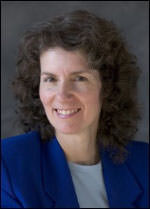 |
||||||||
| MEMO BLOG | Memo Calendar | Memo Pad | Business Memos | Loaves & Fishes | Letters | Home | ||
LEE PERLMAN
THE MID-COUNTY MEMO
 |
| Incumbent Amanda Fritz faces Portland voters again after narrowly defeating her opponent in the May primary. COURTESY AMANDA FRITZ |
Fritz, a nurse, citizen activist and former Portland Planning Commission member, was the second politician to win initial elected office under the defunct Voter Owned Elections process, whereby the city provided campaign funds to candidates who secured 1,000 contributions from local citizens of $5 each. With this resource no longer available to her, Fritz sought campaign donations but said she would accept no single donation over $50. She won the May primary by 1,500 votes, but failed to secure the 50 percent plus one, with former state representative Mary Nolan running a close second. For the general election, Fritz is accepting donations up to $250, and has poured tens of thousands of her own dollars into the campaign while raising little.
Supporters point to Fritz's conscientiousness, her near-perfect record of attendance at council sessions, her diligence in studying legislation prior to hearings, her endorsement from the Oregonian and her habit of answering every email to her office personally. Neighborhood associations remain her base, she attends their meetings regularly, and she notes that she has been the only commissioner to ask to administer the Office of Neighborhood Involvement.
Critics call her a plodder who has done very little in the way of innovations or accomplishments to show for her time on council; they see Mayor Sam Adams' decision to assign her the lightest workload of the five council members as an unspoken put-down of her administrative abilities. They also criticize her championing of the new Office of Equity, which critics call a costly boondoggle and a perfect example of why Portland is mocked nationally.
Asked what bureaus she would want if she could choose them, Fritz said she'd like to retain her existing portfolio (Office of Neighborhood Associations, Office of Equity and Human Rights, Bureau of Emergency Communications, Office of Healthy Working Rivers), plus the Water Bureau. This last, she says, would permit “effective spending of ratepayers' money.” Her objective overall, she says, is “making our system work more effectively with the best use of scarce resources.”
As she enters the final round of the campaign, Fritz's message is stay the course (except for the Water Bureau.)
She continues to defend the Office of Equity and Human Rights, saying it is necessary to overcome long-standing inequities like disparate access to city jobs, contracts, and services.
Asked what she is most proud of, Fritz says she is “proud of including the community in the decision-making process, and making it accountable, transparent and spending taxpayers' dollars wisely.” Asked what her best day was, she replied that it was the day council supported her in a plan to use infrared radiation to purify drinking water (and thus saving $500 million), an oft-repeated campaign boast.
Asked what her worst day was, she cited council's yearly approvals of the Water Bureau's budget over her objections. Runner-up was Adams' decision not to assign to her the Bureau of Development Services. She declined to answer what her biggest regret has been, saying, “I and my staff give 110 percent every day. We don't always succeed, but we give it our all.” She does acknowledge a vote she wishes she could do over, concerning siting cellular phone resources in the public right of way. “I assumed that because I heard no community objections that there had been adequate community outreach and buy-off,” she told the Memo. “I wish I had asked more questions.” She has received some heat from communities in the path of cellular transmission facilities for not taking a stronger stance on this issue.
Fritz says she has been a champion of the East Portland Action Plan, “and I continue to be so. It has been instrumental in leveraging small grants, and building community capacity. I tried to put it into ONI (the Office of Neighborhood Involvement) so that it would not get lost.”
Critics argue EPAP secures political outcomes through cash grants, is redundant and needless and that EPAP provides political cover for City Hall, masking the chronic lack of infrastructure build-out and services in east Portland since annexation in the 80's.
Asked what she or her campaign has done to directly benefit east Portland businesses, she said she is a member in good standing in three Mid-county business associations, the Parkrose, Midway and Gateway Area business associations.
Fritz was reluctant to say where she would next look for cuts if a city budget shortfall demands it. “I can't give you an answer because we do that in conjunction with the community,” and for this year the decisions have been made, she told the Memo. Asked what services she would preserve from cuts at all costs, Fritz said, “Clearly public safety is the most essential,” which includes police, fire and emergency communications.
In recent years local politicians, and political hopefuls, have been caught in embarrassing and even dishonorable conduct. Outgoing mayor Sam Adams saw his political future evaporate when it was revealed that not only had he had an affair with a young intern, but also that he lied about it. How would Fritz handle an incidence of public bad conduct?
“By apologizing, acknowledging the mistake, and making amends,” she says.
 |
 |
 |
 |
 |
MEMO Advertising | MEMO Archives | MEMO Web Neighbors | MEMO Staff | Home
